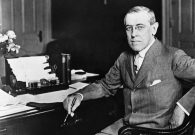Overlooking the Past
In land acknowledgments, there is to be found a fatuous mix of nerve and naiveté. The former comes to light in the public pronouncement that some present-day site was once the ancestral homeland of another people and that those currently occupying it and making the pronouncement have absolutely no intention of giving it back. Imagine finding a lost dog, keeping it, and solemnly proclaiming that this dog traditionally belonged to the Thompsons who live down the street. If the people issuing such statements were not so thoroughly neutered, one might say upon hearing a land acknowledgment: that takes balls.
As for the naiveté, land acknowledgments imply that those who previously occupied the land were autochthons who miraculously sprang from the earth. But outside of noble lies and blinkered minds, there are no autochthons. How far back would one have to go to chance upon a virgin land that had not, in a crude manner of speaking, been bled? An acknowledgment, for example, that “the Northwestern [University] campus sits on the traditional homelands of the people of the Council of Three Fires, the Ojibwe, Potawatomi, and Odawa” may be true, but ignores their role in displacing other tribes (e.g., the Sioux) who themselves no doubt displaced others before them and, moreover, continued to displace others thereafter (consider the displacement—decimation, really—of the Omaha and Poncas at the hands of the Sioux). Even a cursory knowledge of the history of the New World is enough to make clear that America’s indigenous peoples could be just as bloodthirsty and imperialistic as America’s exogenous ones.
Accordingly, land acknowledgments amount to little more than the hollow incantations of a hollow people; insults to injury that vacuously address prior wrongs without doing much of anything to set them right. With restitution off the table, such performative gestures might have merit insofar as they foster a spirit of reconciliation, but it would seem those gestures are as apt to breed resentment as they are reconciliation. To make matters worse, while admissions of wrongdoing can enjoy an expiatory value, land acknowledgments often do more to compound a sense of guilt than alleviate it. Those who engage in these sorts of genuflections generally are more inclined to dwell on and magnify past sins than overcome and move beyond them. One then is left honoring a past that cannot be restored in a present that is not worth honoring. What does that bode for the future?
The past need not be buried to make the present habitable, though doing so can be an effective approach that allows people (and peoples) to move forward. As Nietzsche noted, without forgetfulness,
there could be no happiness, no cheerfulness no hope, no pride, no present. … The man in whom this apparatus of repression is damaged and ceases to function properly may be compared (and more than merely compared) with a dyspeptic—he cannot “have done” with anything.
Whatever the therapeutic benefit of forgetfulness may be, the fact remains that the American people display a studious disinclination to take advantage of it. Indeed, the ability and willingness to face past horrors and accept complicity in them is one of the distinctive virtues of Western Civilization, a virtue that may be traced back to its twin and antagonistic foundations: Athens and Jerusalem. From those wellsprings emerged a stubborn propensity to look both outward and inward; a historical perspective, as well as a confessional one, exemplified in the writings of Herodotus (“the father of history”) and Augustine (author of Confessions). In this regard, it might be illuminating to compare America’s enduring guilt regarding the displacement of Native Americans or enslavement of African ones with how other cultures contend with the atrocities for which they are culpable. For example, consider how Mao’s famine or the Tiananmen massacre is treated in China today, or the Rape of Nanking in Japan, or the Holodomor in Russia, or the Armenian Genocide in Turkey, or, for that matter, the Morori genocide among the Māori.
A more judicious reckoning with the past compels people to apprehend the ubiquity of violence in the vast “tableau of crimes and misfortunes” that Voltaire called history.
That said, expositions of past wrongs can be every bit as duplicitous as undertakings to deny or discount them. In both cases, the truth is subordinated to some other goal, one that incentivizes the manipulation of the past rather than an honest exploration of it. The 1619 Project, whose authors aver that “out of slavery—and the anti-black racism it required—grew nearly everything that has truly made America exceptional,” is as telling an illustration as any. Land acknowledgments are of a piece: they amount to a simplistic if not mendacious (re)framing of the past that does less to illumine historical realities than it does distort present ones. What such narratives suggest is that there is something exceptional about the injustices that litter America’s past; indeed, it is precisely those injustices that make America exceptional. A people cannot imbibe such lessons for long without being consumed by self-hatred. And a people consumed by self-hatred cannot long remain a people.
To combat such perfidious and pernicious narratives, what is needed is a more judicious reckoning with the past, one that neither turns a blind eye to its iniquities nor disassociates them from their larger context; a reckoning that does not rely on fashionable pieties to reconstruct the past and deconstruct the present; one that compels people to apprehend the ubiquity of violence in the vast “tableau of crimes and misfortunes” that Voltaire called history. The ruthlessness that permeates the historical record, and human nature more elementally, was something that Machiavelli never tired of drawing attention to. In the Florentine’s mind, what was vital to the success of Moses, Cyrus, Romulus, and Theseus—the founders of the Jews, Persians, Romans, and Greeks respectively—was the fact that they were armed prophets who did not shrink from using force. As the iron law of Machiavelli would have it: ruin is the inescapable lot of all unarmed prophets. One may quibble about his characterization of Moses as an armed prophet and his omission of that unarmed prophet (Jesus) who, in time, conquered the world over, but his underlying point still stands. As Louis Althusser observed:
Machiavelli is perhaps one of the few witnesses to what I shall call primitive political accumulation, one of the few theoreticians of the beginnings of the national state. Instead of saying that the state is born of law and nature, he tells us how a state has to be born if it is to last. … He does not speak the language of law, he speaks the language of armed force indispensable to the constitution of any state, he speaks the language of the necessary cruelty of the beginnings of the state, he speaks the language of politics without religion that has to make use of religion at all costs, of a politics that has to be moral but has to be able not to be moral. … When we read him, however informed we may be about the violences of history, something in him grips us: a man who, even before all the ideologists blocked out reality with their stories, was capable not of living or tolerating, but of thinking the violence of the birth throes of the state.
A fine observation that is complimented by one of Nietzsche’s own, conveyed with customary pith and provocation: “How much blood and cruelty lie at the bottom of all ‘good things’!”
None of this is meant to obscure the enormities of the past nor exonerate those who had a hand in committing them. But it should be incumbent upon those who would delegitimize America for the crimes and ravages that attended her birth to find exceptions to the Machiavellian measure.



